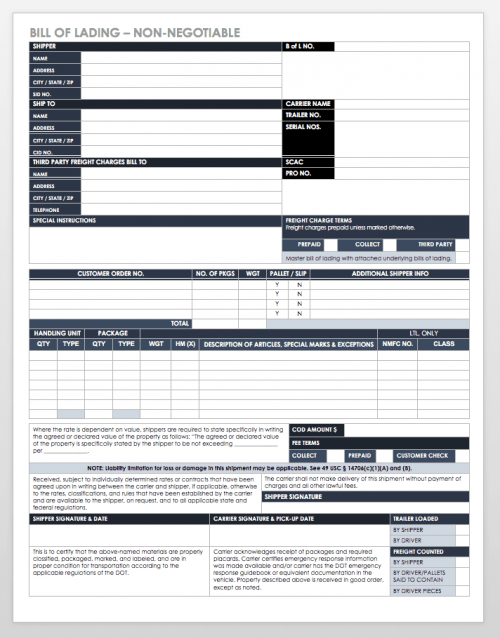
When shipping physical inventory — be it raw materials or finished products — you need to come to an agreement about who is responsible for any lost, delayed, or damaged goods. A bill of lading (BoL) can serve as the legal contract between carrier and recipient, and also as a receipt of inventory being shipped. In this article, you’ll find the most commonly-used bill of lading scenarios and free, downloadable templates available in Microsoft Word and Excel, PDF, and Google Sheets formats that you can customize to fit your needs.

This generic bill of lading template includes space to list recipient and return addresses, shipment tracking numbers, delivery company contact information, and special instructions. In addition, there is space to leave detailed notes about each item in the shipment (quantity, type, weight, etc.) and a statement of liability for any items. At the bottom of the template, you’ll find space for shipper and carrier signatures, which give the entire document validity.
Download Generic Bill of Lading Template
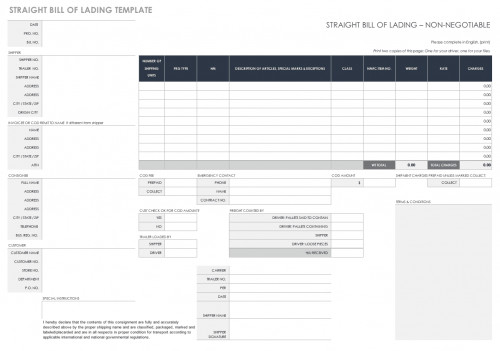 Straight Bill of Lading " width="1197" height="840" />
Straight Bill of Lading " width="1197" height="840" />
A straight bill of lading is a non-negotiable document that ensures cargo is delivered solely to the designated recipient. Under a straight bill of lading, the delivered items are non-transferable — this is different than the typical BoL, which is by nature negotiable (often termed “to order”). If you are handling non-transferable supplies, use this template to guarantee you provide (and sign off on) all the legal details of your agreement. Available in Excel, Word, and PDF formats, this template provides space for shipment details, contact information for the shipper and consignee, and an entire section for fine print terms that you can complete on your own.
Download Straight Bill of Lading Template - English
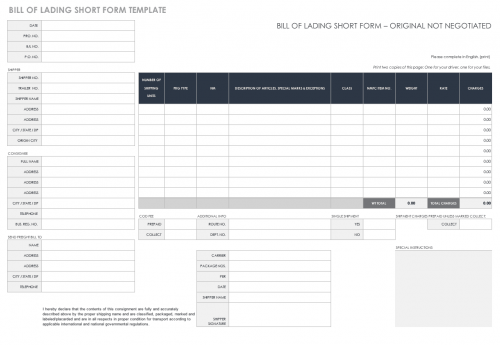
A short form bill of lading provides only the necessary information — contact and shipment information, instructions, and signatures — without additional terms and conditions. Use this template for routine or low-risk orders, but remember to still have both the shipper and carrier sign the document to make it official.
Download Bill of Lading Short Form Template

This template is designed specifically with sea shipments in mind. You’ll provide all the standard BoL contact and shipment information, and also include the vessel number, voyage number, and ports of loading and discharge. Because freight is handled and organized differently on ships than with other distribution methods, be sure to provide specific details on the kind of packages, containers, and goods so nothing gets lost in transport. This template is also available in Excel, Word, and PDF formats — fill out the form on your computer or print and complete it by hand.
Download Ocean Bill of Lading Template

Use this template for ground transportation shipments. Provide contact information for both the shipper and consignee, and then list each package (or “unit”) being shipped as a separate entry in the provided table. Be sure to check whether or not each item contains hazardous material so the shipping company can take the necessary safety precautions. There is also space for additional handling instructions.
Download Trucking Bill of Lading Template

Use this form if you are shipping automobiles. In addition to all the standard information included in a bill of lading, there is a section for noting all existing damages, scratches, dents, or other abnormalities on the vehicle at the time of shipment. Completing this section ensures that you know who is responsible for any further damage upon delivery. Automobiles are expensive and difficult to physically transport, so ensure that all parties read and agree to any listed conditions, which you can customize to fit your specific arrangement.
Download Auto Transport Bill of Lading Form
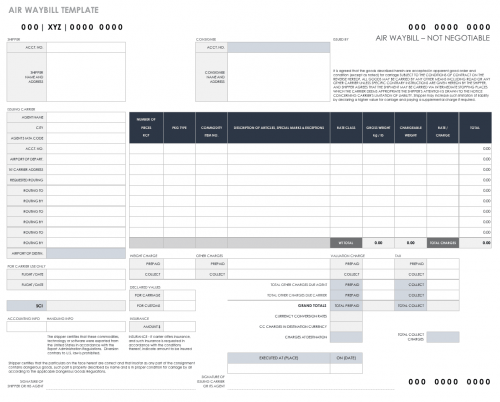
An air waybill (AWB), also called a consignment note, is a non-negotiable document that functions as a contract of carriage and receipt of goods shipped by an international airline. Depending on the circumstances, it can also serve as an invoice, proof of insurance (the shipper is held accountable to deliver the goods), and even a customs declaration. This air waybill template includes space for parties’ contact information, transportation details (airport of departure and destination, flight date, etc.), and insurance. Then, list all the specifics of the goods being shipped: item number, weight, chargeable rate, description of goods, tax, and more.
Download Air Waybill Lading Template
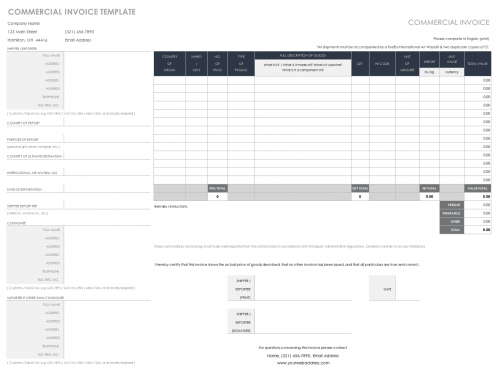
In many ways, a commercial invoice functions similarly to a bill of lading: On both, you’ll list contact information for the shipper and recipient, details about the goods being shipped, and signatures. What differentiates a commercial invoice is that you must also provide pricing information — as such, the document can double as a bill. You can also use the invoice as a customs declaration for international trade. Use this Excel template to create a comprehensive commercial invoice that keeps all shipment and pricing information in one place.
Download Commercial Invoice Template
 Straight Bill of Lading Template French" width="1198" height="860" />
Straight Bill of Lading Template French" width="1198" height="860" />
For shipping to and from Canada, the government requires much of the information typically included in a bill of lading: consignor, consignee, pieces, weight, product description, whether or not it is prepaid, declared value, and any special delivery or service instructions. The main difference is that all information must be reported in both English and French. This template provides an English and French translation of the Straight Bill of Lading template above for use on any international shipments to or from Canada.
Download Canadian Bill of Lading
A bill of lading (often abbreviated to B/L or BoL) is a legal document that functions as a receipt of goods or freight being shipped. Created by the supplier, the BoL travels with the inventory, and is given to the recipient as formal proof that the requested goods have moved to the shipment stage — therefore, it is critical to ensure that the supplier is paid and that the recipient receives the cargo on time and undamaged. Bills of lading are most often used in international trade. In British English, the term refers only to goods being transported by ship, but in the U.S. it can be used for a variety of transportation modes.
A bill of lading includes contact information for all involved parties, purchase order number and other tracking numbers, shipment and expected delivery dates, information on the delivery method (mode of transportation, shipment company, etc.), and a detailed inventory of what the shipment contains. In addition, the BoL typically includes any special shipping instructions, as well as terms and conditions of the delivery agreement between supplier and recipient.
As mentioned, a bill of lading is a legal document — that means that a critical aspect is getting signatures of approval. In most cases, the supplier will sign the BoL once the goods have been packed into the delivery method (truck, ship, freight train, airplane, etc.), and the recipient will sign the BoL when they receive the requested, undamaged, on-time goods.
The function of a bill of lading is simple, but its full utility might not be immediately evident. Ultimately, a BoL protects the seller, shipper, and recipient against lawsuits by providing a record of when and where a shipment is in delivery — therefore, it serves as a receipt and a contract of carriage. If an issue arises (i.e., the shipment is late or lost), you can use the BoL to help determine when or where the problem might have occurred, and hold the correct party responsible.
Remember: A bill of lading is technically a legal document, so ensure that all information listed on it is accurate and up to date. Of course, the BoL is rendered useless unless it is signed and dated by all involved parties.
Empower your people to go above and beyond with a flexible platform designed to match the needs of your team — and adapt as those needs change.
The Smartsheet platform makes it easy to plan, capture, manage, and report on work from anywhere, helping your team be more effective and get more done. Report on key metrics and get real-time visibility into work as it happens with roll-up reports, dashboards, and automated workflows built to keep your team connected and informed.
When teams have clarity into the work getting done, there’s no telling how much more they can accomplish in the same amount of time. Try Smartsheet for free, today.